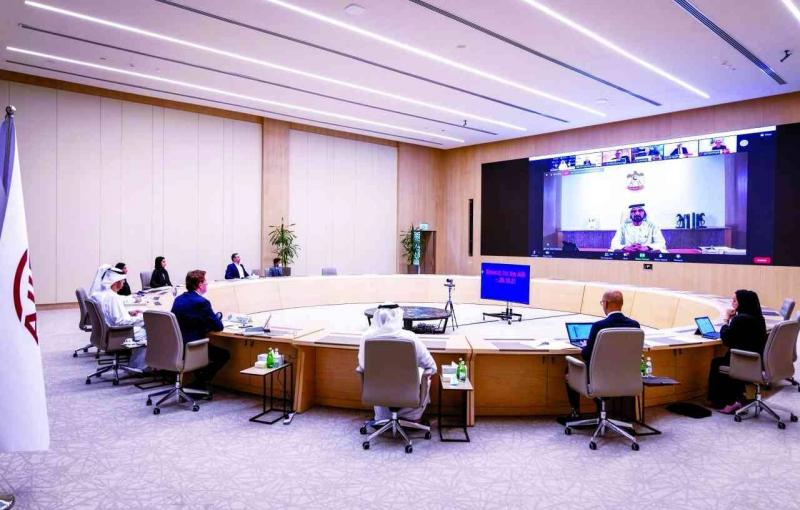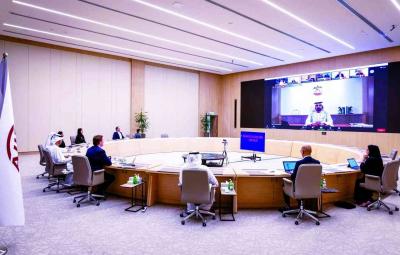His Highness Sheikh Mohammed bin Rashid Al Maktoum, Vice President of the State, Prime Minister, and Ruler of Dubai, inaugurated the sixth annual meeting of the Board of Governors of the Asian Infrastructure Investment Bank, chaired this year by the UAE. The meeting is held virtually over three days with the participation of 103 countries from the bank's members and strategic partners.
In his keynote address, Sheikh Mohammed welcomed the attendees and emphasized that the meeting represents a platform for communication and enhancing economic partnership and cooperation among countries. He stated to the participants: "We welcome and meet with you as we coincide with the events of Expo 2020, where the world gathers here in the UAE... Everyone is celebrating the fiftieth year of our nation... We celebrate with you all the partnership and global economic cooperation... We are keen on the success of this meeting, hoping for tangible results that benefit peoples... Wishing the bank’s meetings in the UAE every success."
This is the first time the Board of Governors meeting has been hosted in the Middle East. Representatives of member countries of the Asian Infrastructure Investment Bank are discussing ways to accelerate sustainable development under the slogan "Invest Today for a Bright Future."
**Golden Jubilee**
His Excellency Dr. Sultan Ahmed Al Jaber, Minister of Industry and Advanced Technology and Governor of the UAE at the bank, welcomed the participants in his speech, stating: "As we prepare to celebrate the golden jubilee of the UAE, and with Expo 2020 Dubai, we look proudly at all the achievements our nation has accomplished, and we look with determination and confidence to solidify its position at the forefront of advanced nations around the world. As one of the founding members of the Asian Infrastructure Investment Bank, the UAE takes pride in supporting the bank’s strategic goals, contributing to elevating all Asian countries to prominence among the world."
He added: "Through the vision of our wise leadership, we in the UAE are creating new opportunities in various fields of sustainable development, focusing on aligning with the transformation in the energy sector, building a knowledge-based economy, and developing the industrial sector, in line with the principles of the fifty, which represent the strategic roadmap for the next phase of the UAE's economic, political, and social development. Additionally, we are launching pioneering initiatives such as the strategic initiative for achieving climate neutrality by 2050. These initiatives underscore our shared vision with the Asian Infrastructure Investment Bank, which has the same commitment to sustainability and economic development, as clearly demonstrated in its strategic goal announced in 2020 to allocate 50% of its total financing until 2025 for climate-friendly projects. This orientation toward adopting climate projects serves as a model."
**Climate Projects**
After the opening ceremony, Mohammed Saif Al Suwaidi, Director General of the Abu Dhabi Fund for Development and Deputy Governor of the UAE at the Asian Infrastructure Investment Bank, spoke during the roundtable discussions of the Board of Governors titled "Financing Climate Projects," focusing on the importance of international cooperation, partnerships, and continuous dialogue to bridge the investment gap in infrastructure and encourage green financing.
Al Suwaidi said: "The growing momentum for investment in green infrastructure is of paramount importance for the future. Long-term thinking in investment for the future will also be a cornerstone for sustainable development. There is no doubt that the discussions at the sixth annual meeting of the Asian Infrastructure Investment Bank's Board of Governors are very vital if we want to stimulate investments in infrastructure that support global efforts to address climate issues."
**Enhancing Investments**
Jin Liqun, President of the Asian Infrastructure Investment Bank, during his participation in the virtual press conference held on the sidelines of the bank's annual meeting, stated: "Our work will focus on enhancing investments in the adaptation and resilience of low-income member countries and improving emerging technologies to drive action on climate change."
Jin added: "The bank's commitment to the Paris Agreement will be translated into financing sovereign and non-sovereign projects, including investments made through financial intermediaries. The Asian Infrastructure Investment Bank is currently working on establishing a strict mechanism to ensure the selection of projects that support achieving net-zero carbon emissions in alignment with the goals and standards of the Paris Agreement. The approach is based on the international standards and frameworks that are currently being developed in collaboration with other multilateral development banks."
**Paris Agreement**
The Asian Infrastructure Investment Bank announced its strategy to align its operations and projects with the goals of the Paris Climate Agreement by July 1, 2023. The bank estimates that cumulative approvals for climate financing will reach $50 billion by 2030, quadrupling its annual climate financing commitments since it began publicly reporting this funding in 2019. This announcement marks an important step toward achieving the goal of the Asian Infrastructure Investment Bank, which earlier this year announced the allocation of about 50% of its actual financing approvals for climate financing by 2025.
The Asian Infrastructure Investment Bank President stated: "We are at a historically critical moment that requires bold, swift, and widespread collective action if we are to limit global warming and protect our planet." He added: "This announcement solidifies the Asian Infrastructure Investment Bank's long-term commitment to supporting climate action in line with the Paris Climate Agreement. We believe that moving forward with this step requires greater cooperation from the private sector so that we can collectively meet our commitments and build a comprehensive, just, and sustainable future."
**Reducing Carbon Emissions**
Before the United Nations annual climate change conference COP26 in November, more than 130 countries will commit to adopting carbon reduction goals or achieving "net zero" emissions by 2050. However, the current level of ambition outlined in these plans is still far from achieving the goals of the Paris Agreement to limit global warming to 1.5 degrees Celsius above pre-industrial levels. The Asian Infrastructure Investment Bank sees increased investment in emerging technologies as key to raising climate ambition.
Jin Liqun stated: "As a multilateral bank relying on innovation, we believe that technology can serve as a lever to reduce greenhouse gas emissions. However, this will require a more focused approach to adopting new technologies as a fundamental element of any comprehensive response to global climate change. Ultimately, the private sector, investors, and governments must come to the table and collaborate with us to combat the worst impacts of climate change."
The focus on resilience and adaptability will enhance the bank's ambitious goal of allocating 50% of its financing approvals to climate financing by 2025. Climate financing constituted 41% of the bank's infrastructure portfolio in 2020. Jin Liqun continued: "There is no one-size-fits-all solution. Appropriate climate financing may require fundamental shifts in infrastructure and in our behavior. There are many tools available to us, such as flood and storm guard walls, improved building standards, and resilient infrastructure. Securing funding to implement these measures is vital, especially in developing countries."
**Sustainable Infrastructure for the Future**
This year's meeting program focuses on themes centered around creating future infrastructures based on the principle of sustainability. Topics also include cross-border infrastructure connectivity, green financing, and the role of multilateral development banks in supporting environmentally, socially and governance-oriented projects, resilient healthcare infrastructure, gender equality, and the infrastructure sector in a post-COVID world.
Costs for resilience alone in developing countries are estimated between $140 and $300 billion annually by 2030. Currently, the total funding for resilience and to eliminate vulnerability to accelerate the implementation of sustainable development goals stands at only $30 billion, according to the United Nations.
In parallel with the annual virtual meeting of the bank, the UAE is organizing two in-person seminars in Abu Dhabi that specifically highlight the UAE and the Middle East. Participants from the Asian Infrastructure Investment Bank and speakers from the UAE government and sector experts will present their vision and opinions on the region to attendees from around the world.
The first seminar is titled "How Can Innovative Financing Bridge the Infrastructure Spending Gap in the Middle East," taking place this Wednesday morning at the Abu Dhabi Global Market headquarters on Al Maryah Island. The second seminar, titled "How the UAE Supports Climate-Resilient Infrastructure in the Middle East," will be held tomorrow morning at the International Renewable Energy Agency (IRENA) headquarters in Masdar City.
It is noteworthy that the Asian Infrastructure Investment Bank announced in 2020 its strategic goal to allocate 50% of its total financing until 2025 for climate-friendly projects (with climate financing constituting 41% of total financing in 2020). As a founding member of the bank, the UAE's strategic plans align with the bank's vision and priorities as the country continues to advance sustainable development through its fifty principles and its strategic initiative to achieve climate neutrality by 2050.




